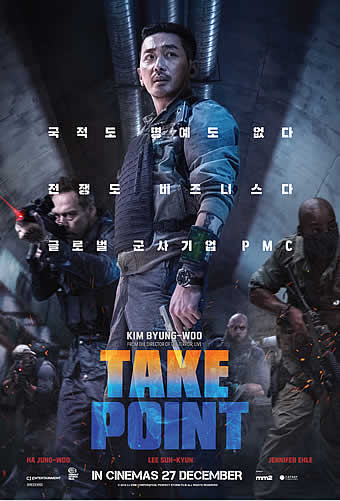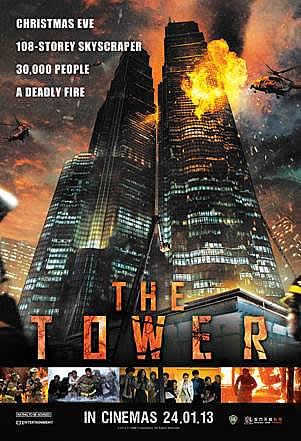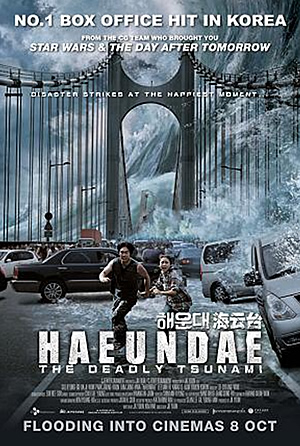ASHFALL (백두산) (2019)
Genre: Action
Director: Lee Hae Jun, Kim Byung Seo
Cast: Lee Byung-hun, Ha Jung-woo, Ma Dong-seok a.k.a Don Lee, Jeon Hye-jin, Bae Su-zy
Runtime: 2 hrs 8 mins
Rating: PG13 (Some Violence and Coarse Language)
Released By: Encore Films
Official Website:
Opening Day: 2 January 2020
Synopsis: An unexpected eruption of Korea’s tallest volcano sitting on the Chine-North Korea border leaves the peninsula in shambles. When seismologist Bong-rae suggests a theory that could possibly stop the explosion, In-chang, a bomb squad agent, is given his last mission before returning home to his wife, Ji-young. In-chang must now seek and join hands with rogue North Korean elite officer Jun-pyeong to stop the imminent devastation.
Movie Review:
If there is one genre which South Korean cinema has not been able to conquer, it is the disaster film. While crowds flocked to ‘Haeundae’, which was billed as the first for the industry, it was ultimately dismissed as cliched and hackneyed; the same criticism was levelled at ‘The Tower’, which ended up grossing less than half of its genre predecessor. Yet, if its pedigree is anything to go by, ‘Ashfall’ has good chance of breaking out of that mould, seeing as how it is produced by the people behind the ‘Along with the Gods’ franchise.
There is no lack of ambition here, which opens with the eruption of Mount Paekdu and the consequent destruction of the Korean peninsula; in particular, you’ll be left in awe at the magnitude of the damage to North Korea and downtown Seoul, which is just about as spectacular as anything Hollywood has ever wrought. But as we soon learn, that is only the beginning: according to renowned Korean-American seismologist Bong-rae (Ma Dong-seok), three more eruptions are due, with the last super-eruption most certainly to annihilate both Koreas.
The plan, as conceived by Bong-rae and with the support of the South Korean military, is to ignite a nuclear explosion right in the depths of Mount Paekdu, by stealing six nuclear warheads belonging to the North Koreans. That high-stakes mission falls to In-chang (Ha Jung-woo), who is serving out his last days of Explosive Ordinance Disposal Unit of the South Korean army, and would require that In-chang and his fellow reservist members work with the duplicitous North Korean spy Jun-pyong (Lee Byung-hun) to infiltrate a North Korean missile base and deposit the payload at a specific location within the labyrinth of underground mines under the mountain.
Mixing the elements of a disaster film with the narrative of an espionage thriller proves especially inspired, seeing how it avoids the sort of melodrama that the former ends up being; in fact, the latter offers plenty of tense moments throughout the film, what with In-chang having to second-guess at every turn if Jun-pyong is plotting something behind his back. Oh yes, it should come as no surprise that Jun-pyong has an agenda of his own, so much so that In-chang’s challenge lies not just in the mission itself, but also to ensure that Jun-pyong doesn’t derail it.
Whilst In-chang gets the standard character definition as a faithful husband whose wife (Bae Suzy) and unborn child is waiting for him to return home safe, it is his relationship with Jun-pyong which ultimately anchors the movie. Both start off distrusting each other for good reason, which in turn sets up several amusing encounters as they try to outsmart each other, but that slowly gives way to a moving sense of camaraderie between them that makes the finale even more poignant. That is also credit to the unlikely chemistry between Lee and Ha, which lends both depth and authenticity to how their relationship evolves over the course of the film.
To the credit of writing-directing duo Lee Hae-jun and Kim Byung-seo, there are plenty of harrowing and thrilling moments throughout the film’s two hours – besides the confrontation between In-chang and Jun-pyong, there is also the interesting complication of the political dynamics between the two Koreas, as well as between America and South Korea. Without giving too much away, let’s just say it is a reflection of current political realities that the allies are no longer as chummy as you would expect them to be, and that there is no vilification of the North in the portrayal of its nuclear-ready neighbour.
It isn’t just brinksmanship on display of course; there are shoot-outs and vehicular chases with both the North Koreans and US forces to keep your adrenaline pumping. One particularly memorable set-piece has In-chang’s team infiltrating an underground North Korean nuclear weapons factory to get the six warheads, just as the next eruption triggers a massive earthquake; and another has In-chang and Jun-pyong struggling to hold onto the nuclear device from the back of a bus while evading a US tank next to them and fleeing a collapsing suspension bridge. If it isn’t yet apparent, there is no lack of scale in the action, and we’re not just talking about the natural disaster itself.
Indeed, it is no overstatement that ‘Ashfall’ is the best South Korean disaster film yet – the eruptions themselves are vivid and humbling, especially given how scientists have in real life warned of such a massive event; the plotting is surprisingly engaging, full of the sort of inter-Korea personal and political dynamics which South Korean cinema has developed an art for; and last but not least, the star power brought on by Lee and Ha is terrific. We’d even go as far to say that it is probably one of the best disaster films of recent time, certainly able to stand up to anything Hollywood specialist Roland Emmerich has done. Go and see it on the biggest screen possible; you’ll enjoy the spectacle, the emotion and the non-stop action even more.
Movie Rating:




(Not only the best South Korean disaster film but also one of the best disaster movies of recent time, 'Ashfall' mixes the definitive elements of the genre with the narrative of an espionage thriller for a gripping, poignant and awe-inspiring spectacle)
Review by Gabriel Chong
You might also like:





